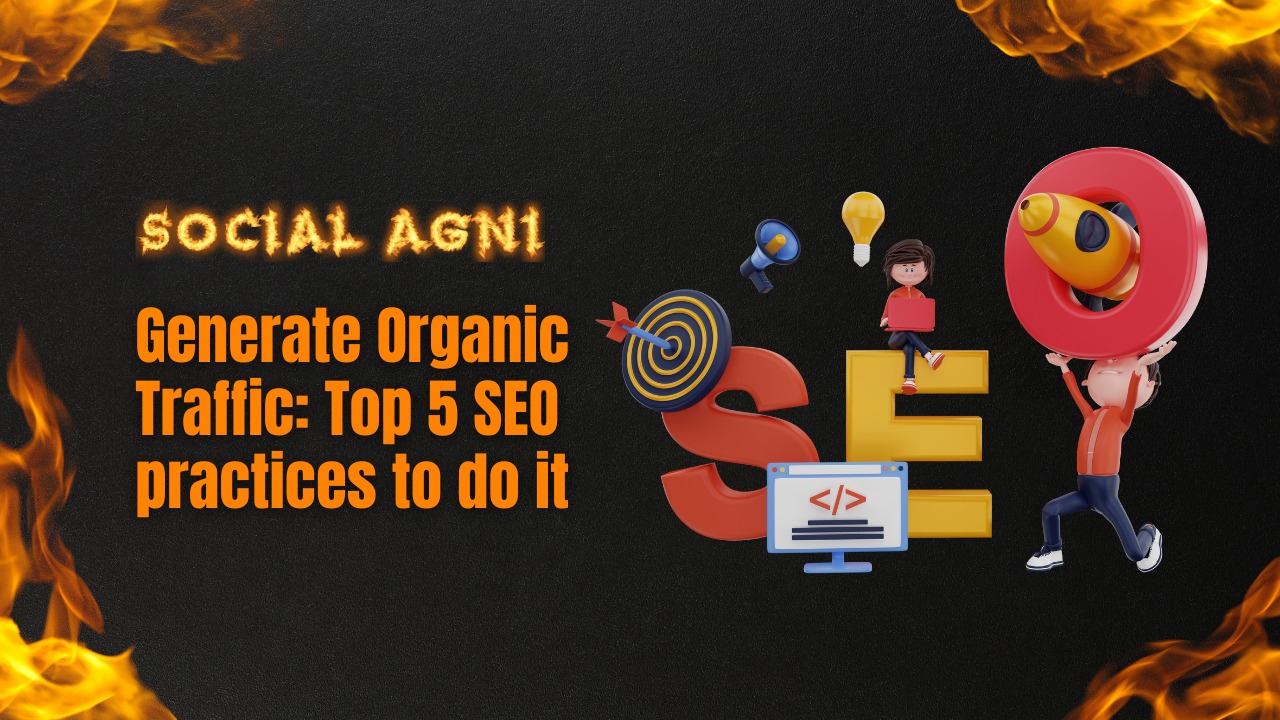Today’s businesses rely largely on web visitors for both lead generation and customer purchases. Organic traffic, which refers to users that arrive at your website through unpaid search engine results, is one of the most important kinds of online traffic. Your website’s organic According to how high it appears in search engine results, traffic will rise. The practice of improving a website’s exposure on search engine results pages is known as SEO or search engine optimization. This article will go through five of the best SEO tactics for increasing a business’s organic search traffic. Search engine optimization (SEO) copywriting, link building, content creation, and technical SEO are a few examples. By boosting their visibility in SERPs, their proportion of organic traffic, and other metrics, these strategies may assist firms in enhancing their online presence. Top 5 SEO Practices to Generate Organic Traffic: If you enjoy improving organic traffic to your website, you must involve a combination of SEO tactics. Here are the top 5 SEO strategies utilize to boost organic traffic: 1. Keyword Research and Optimization: Improving your website’s search engine rating and attracting more organic visitors requires diligent attention to detail, including thorough keyword research and optimization. Your website’s search engine visibility may be improved by including the keywords your target audience is using to find items and services like yours in the content on your site. Use Google’s Keyword Planner, SEMrush, or Ahrefs to find relevant keywords. Using these resources, you may find profitable, high-volume keywords. In addition to finding broad keywords, these resources can help you find long-tail keywords that are more precise and useful. Your content must be pertinent to your audience’s needs, engaging, and beneficial. Websites may raise their search engine rankings and the amount of time visitors spend on the site by catering to their needs and interests with helpful content. The success of keyword optimization also depends on performing keyword research and updating content often. Because of how quickly search trends and user behavior can change, it’s essential to always employ the most up-to-date terms and refresh your content. Increase your organic traffic by conducting keyword research and optimizing your website for search engines. 2. Content Creation and Optimization: Writing engaging content is crucial to SEO. Your website content must be relevant, engaging, and valuable. Useful content boosts search engine rankings and user engagement. If you want your material to resonate with readers, you need to tailor it to their wants and interests. Content and on-page SEO are invaluable. The text, headers, and visuals should include relevant keywords and be structured for easy reading. For context and relevancy, include internal and external links. Content quality must come first. It’s crucial to frequently publish well-researched, informative, and engaging material. If you establish your website as an industry authority, it will rise in search engine ranks. Regular content audits and updates are also necessary for effective content development and optimization. Examine your current material and think of ways to improve it to do this. To do this, you can fix any errors or omissions you see, add extra sections or examples, or just streamline and organize your work. Finally, to attract organic traffic, search engine optimization (SEO) significantly relies on producing and optimizing content. You can increase your website’s traffic, leads, and conversions by tailoring your content to your audience’s preferences, implementing on-page SEO best practices, and doing frequent content audits and upgrades. 3. Backlink Building: To boost your website’s search engine rankings and get more organic visitors, link building is a crucial part of off-page SEO. When other websites connect to yours, this is called a backlink and it shows that you’re an authoritative resource in your field. Backlinks are an indicator of your content’s quality and relevance to search engines. Creating high-quality content that other sites will want to connect to is essential if you want to get inbound links. To do this, you must first learn about and then cater to the specific wants and interests of your intended audience through your content. You may also reach out to related websites and offer to write guest articles for them or work together on content. Content marketing is another powerful strategy for increasing inbound links. To maximize your content’s exposure and its ability to garner links, you should promote it using social media, email marketing, and other methods. In addition, you may find journalists and bloggers that are seeking expert sources in your field by using platforms like HARO (Help a Reporter Out). It’s more vital to create high-quality backlinks than to create a large number of them. Your search engine rankings and online reputation might potentially take a hit from spammy or low-quality backlinks. Instead, you need to work on getting connections from reputable, authoritative sites in your area. Monitoring your website’s backlink profile and disavowing any spammy or low-quality connections is just as vital as gaining backlinks. Backlinks to your site may be monitored for problems using services like Google Search Console or Ahrefs. In sum, backlink building is a crucial part of search engine optimization that may boost your website’s visibility in SERPs and bring in more visitors naturally. Establishing your website as a reliable resource and attracting more visitors will lead to more leads and sales for your company if you focus on producing and distributing high-quality content. 4. Technical SEO: Improve your website’s search engine rankings and get more targeted organic traffic by focusing on the technical aspects of SEO. To improve your site’s crawl ability and indexation by search engines, you should optimize its code, structure, and speed. Website speed optimization is an essential part of technical SEO. Websites that load quickly not only benefit visitors but also perform higher in search engine results. You may improve your website’s load time by using a content delivery network (CDN), compressing your images, and minifying your CSS and JavaScript scripts. Mobile optimization is also a crucial part of technical SEO. Your website must be compatible with mobile devices
